Despite a minor decrease in overdue B2B invoices, 45.0% of businesses in Eastern Europe reported having to manage the negative impact of payment delays.
In 2018, Atradius Payment Practices Barometer survey respondents from Eastern Europe reported fewer late payments. However, businesses in the region still felt the impact of payment delays. 18.1% of respondents reported that they needed to postpone payments to suppliers while 14.1% experienced revenue loss. The proportion of uncollectable B2B receivables however is stable and bankruptcy remains the main reason for write-offs.
Trading on credit – to reward loyalty and build new business relationships
The proportion of B2B credit sales in Eastern Europe decreased from an average of 40.3% in 2017 to 36.9% this year. This was mainly due to a decrease of almost eight percentage points in Hungary and minor decreases in Turkey and the Czech Republic. Despite selling on credit significantly less than one year ago, respondents in Hungary remain the most inclined to offer credit terms (on average, 57.6% of B2B sales made on credit terms). In contrast, respondents in Romania seem to be the least inclined to offer credit terms (on average, 17.7% of B2B sales transacted on credit terms).
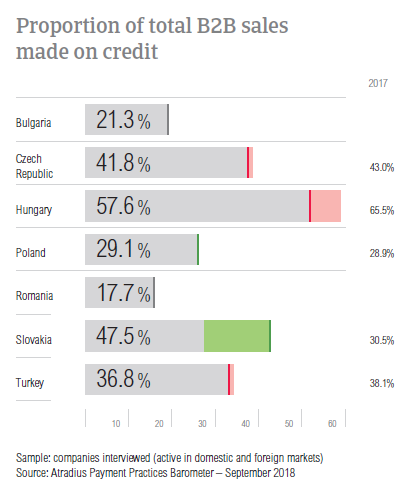
Granting trade credit to maintain and nurture business relationships
Respondents in the Eastern European countries surveyed are more likely to sell on credit terms to their domestic B2B customers than to their B2B customers abroad. Domestic credit terms seem to be granted mainly to reward long-lasting business relationships and because credit sales are common practice. There is also a shared belief that selling on credit can stimulate local expansion by attracting new customers. 41.5% of respondents said refusing to grant credit terms is mainly due to the poor payment behaviour of their domestic B2B customers and 34.2% said that it’s a decision based on the financial weakness of the customer.
Credit sales help us win new customers and brought our company a sales increase of 30%.
Businesses in Eastern Europe seem to grant trade credit to foreign B2B customers mainly for the same reasons; common practice, to build trust and relationships and to attract new customers. There are, however, different explanations for refusing credit sales. More specifically, 24.1% of respondents in the region said that they refuse to grant credit terms to their B2B customers abroad due to high currency risk and 19.0% because there is high economic and/or political risk in the customer’s country.
We trade on credit when there’s long-term cooperation and increased trust.
Most Eastern European suppliers feel the impact of late payment
Respondents from all countries surveyed in the region – with the exception of Hungary and Turkey – reported payment delays less frequently than one year ago. More specifically, 80.7% of respondents in Eastern Europe reported frequent late payments by their B2B customers compared to 83.7% in 2017. Late payments seemed to occur significantly more frequently with domestic B2B customers than with B2B customers abroad.
After a minor decrease from 43.0% in 2016 to 41.2% in 2017, the proportion of past due B2B receivables in Eastern Europe dropped for a third consecutive year and stands at 35.9% in 2018. The regional decrease was significantly influenced by the low proportion of overdues in Bulgaria, Romania and by Slovakia (where the proportion of past due B2B invoices decreased from 41.5% to 25.1% this year). By customer type, the average proportion of foreign past due B2B invoices is lower than that of domestic past due B2B invoices.
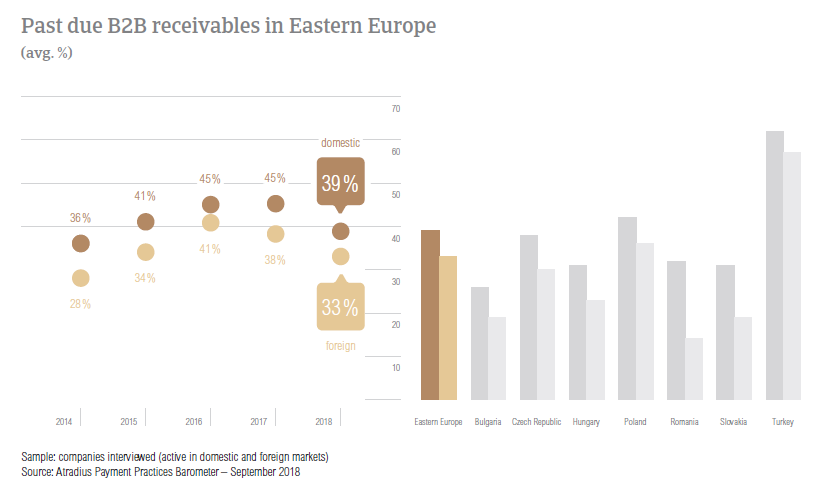
In 2018, the average Days Sales Outstanding (DSO) figure recorded in Eastern Europe is 59 days, two days shorter than last year. Similarly to 2017, the majority of respondents in the region (62.5%) do not expect to see any changes in their company’s DSO figure and 20.8% expect a slight increase over the coming 12 months.
Turkey – frequent late payments and the highest proportion of overdue B2B invoices
Like in 2017, Turkey and the Czech Republic had the highest percentages of respondents who reported frequent late payments by their B2B customers (91.7% and 89.8% respectively). Moreover, the percentage of respondents who reported this in Turkey increased slightly. In contrast, respondents in Romania were the least likely to report late payments (on average, 55.4% of respondents).
In 2018, Turkey continues to be the country with the highest proportion of domestic and foreign past due B2B invoices. Additionally, the proportion of overdue B2B invoices here increased from an already high average of 55.9% in 2017 to 59.9% in 2018. Interestingly, this is not reflected in the country’s DSO figure which decreased by nine days this year. After Turkey, the country with the highest percentage of past due B2B invoices is Poland (on average, 39.0%).
A faster invoice to cash turnaround
Domestic B2B customers of respondents in Eastern Europe have, on average, 35 days to fulfil their payment obligations (no changes in comparison to 2017). Foreign B2B customers are given, on average, 34 days to settle their invoices (35 days in 2017). While the average payment terms in Eastern Europe have remained largely stable, at country level, Slovakia reported the biggest changes (three days decrease for domestic B2B customers and five days decrease for B2B customers abroad).
Turkey remains the country that offers the most lenient payment terms in the region (on average, 54 days and 44 days respectively). In contrast, respondents in the Czech Republic set the shortest payment terms (on average, 28 days).
When asked if their companies differentiate payment terms between domestic and foreign B2B customers, respondents in Slovakia, Romania and Hungary are the least likely to differentiate and Turkey is the most likely to differentiate payment terms. The main reasons for differentiation mentioned in all countries surveyed are internal policies and local industry practices. Other noteworthy reasons are that domestic payment terms are determined by law (mentioned in the Czech Republic, Slovakia, Bulgaria, Romania and Turkey), the financial risk related to the export transaction (mentioned in Poland, Hungary, Turkey and Bulgaria) and the economic situation (mentioned in Turkey and the Czech Republic).
Payment delays mainly due to insufficient availability of funds
Respondents in Eastern Europe reported decreases in payment delays from both their domestic and foreign B2B customers. Domestic and foreign B2B customers seem to delay payment, on average by 20 days. This compares to 23 days for domestic and 21 days for foreign B2B customers in 2017. Slovakia reported decreases in payment delays from both their domestic and foreign B2B customers. In contrast, and despite already reporting the longest delays in the region, respondents in Turkey declared further increases.
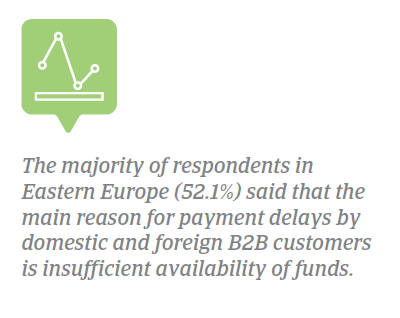
68.8% of respondents in Eastern Europe said that the main reason for payment delays by their domestic customers is insufficient availability of funds; a much higher percentage than in 2017 (58.4%). This steep increase occurred mainly because of the high percentage registered in new survey countries Bulgaria and Romania plus increases reported in Turkey, Slovakia and the Czech Republic. Another important reason for payment delays by domestic B2B customers, stated by 30.9% of respondents in the region is buyer using outstanding invoices as a form of financing.
35.4% of respondents stated insufficient availability of funds by foreign B2B customers (33.6% in 2017). The second most frequently cited reason for payment delays by B2B customers abroad was the complexity of the payment procedure, stated by 32.5% of survey respondents; a significant increase from the 25.7% who stated this reason in 2017. The percentage of respondents who reported this reason increased in Turkey, Hungary and Poland.
The majority of respondents in Eastern Europe (54.7%) said that payment delays did not have a significant impact on their businesses. However, 18.1% reported that they needed to postpone payments to suppliers. For 14.1% of respondents, payment delays had a more significant impact as it led to revenue loss.
The fastest/slowest invoice to cash turnaround in Eastern Europe
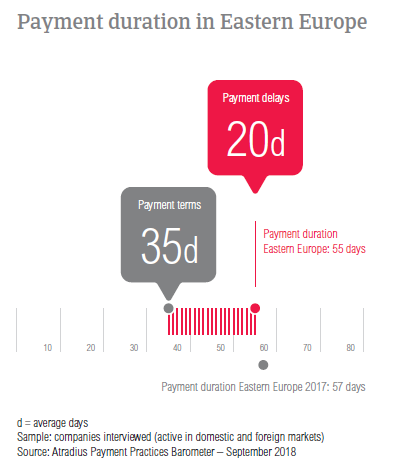
Based on the changes in payment terms and payment delays, the average payment duration in Eastern Europe decreased slightly from 57 days in 2017 to 55 days in 2018. Turkey is the only country in the region in which the average payment duration increased. Similarly to what was reported in previous surveys, Turkey takes the longest to convert B2B invoices into cash. In 2018, the average payment duration here increased by a week and now stands at 91 days on average. In contrast, respondents in Hungary seem to have the shortest invoice to cash turnaround (on average, 40 days).
E-invoicing: common practice but no clear effect on payment duration
65.7% of respondents in Eastern Europe said that they are already using electronic invoicing (e-invoicing) with their B2B customers. By country, e-invoicing appears to be most broadly used in the Czech Republic (77.9% of respondents). They are followed by their peers in Poland and Slovakia (72.6% and 70.2% respectively). In contrast, with a percentage of 48.7%, respondents in Hungary are the most reluctant to invoice online. However, with 15.1%, Hungary is also the country where the respondents are most willing to adopt e-invoicing this year.

The majority of respondents in Eastern Europe seem to be e-invoicing, but has the change accelerated payments? 50.0% of respondents in the region said that after invoicing their B2B customers electronically, they received payments quicker. 47.4% said that e-invoicing had no noteworthy effect and only 2.7% said that it caused a slowdown in payment.
While the survey responses do not show a major difference between the respondents who have experienced faster payments and those who have seen no noteworthy effect – the average payment duration in Eastern Europe decreased slightly.
US protectionism – the biggest risk to global economic growth
Global economic growth is continuing to strengthen and is forecast to accelerate to 3.2% in 2018. At the same time, potential risks to the outlook have increased with US protectionism, US Fed policy, China’s’ ‘hard landing’ and geopolitical risk as some of the most significant ones. Of these risks, US protectionism turning into a trade war is perceived by the most respondents (37.7%) to be the most likely to hamper global economic growth in the upcoming six months. A slightly lower percentage, 23.3%, of respondents in the region believe that US protectionism is a significant risk but is not the most significant one. Only 19.3% of respondents believe this is the least significant risk. By country, the highest percentage of respondents believing that US protectionism may trigger a global trade war that hampers global growth was recorded in Turkey (53.1%).
While businesses trading internationally expect negative effects brought by US protectionism and a potential trade war, they do not seem as concerned about the Fed policy or a potential hard landing in China. These were considered to be the most significant risks to global economic growth by only 16.2% and 21.9% of respondents respectively. At the other end of the scale, 42.3% of respondents in the region mentioned geopolitical risk as the least significant risk for the coming six months.

Uncollectable B2B receivables – mainly due to bankruptcy
The average proportion of uncollectable B2B receivables in Eastern Europe is stable at 0.9% after 1.0% in 2017. With the exception of Turkey, uncollectable B2B receivables in the region averaged around 1.0%. Bulgaria and Romania had the lowest percentages (on average, 0.4%). Slovakia follows with 0.6%, still one of the lowest percentages in the region despite a minor increase in 2018. Turkey continues to be the country with the highest percentage of uncollectable B2B receivables in 2018. However, there was a small improvement, from an average of 2.2% in 2017 to 1.9% this year.
Payment practices by industry
In 2018, respondents in Eastern Europe gave their customers 35 days, on average, to pay invoices obligations. Looking at the average payment terms by sector, B2B customers of respondents in the metals (on average, 46 days), machines and construction materials sectors (each with 45 days on average) were given the most lenient payment terms. In contrast, B2B customers in the services sector had the shortest time to fulfil their payment obligations – on average, 28 days.
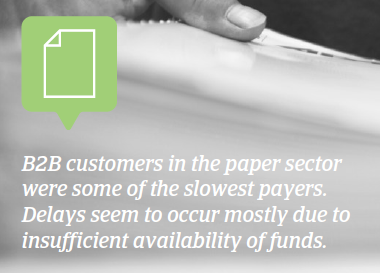
B2B customers of respondents in the construction materials and those in the paper sector seem to have generated some of the longest payment delays. Domestic and foreign B2B customers in these sectors paid, on average, 19 and 18 days late respectively. Similarly to what was stated for the region overall, the main reasons for payment delays were insufficient availability of funds and buyers using outstanding invoices as a form of financing.
Looking at changes over the coming 12 months, most respondents in construction materials (44.0%) do not expect any changes in the payment behaviour of their B2B customers. Should a change occur, 33.0% believe that it will be a deterioration. Respondents in the paper sector showed similar results, 52.0% do not expect any changes while 32.0% foresee deterioration in the coming 12 months.

